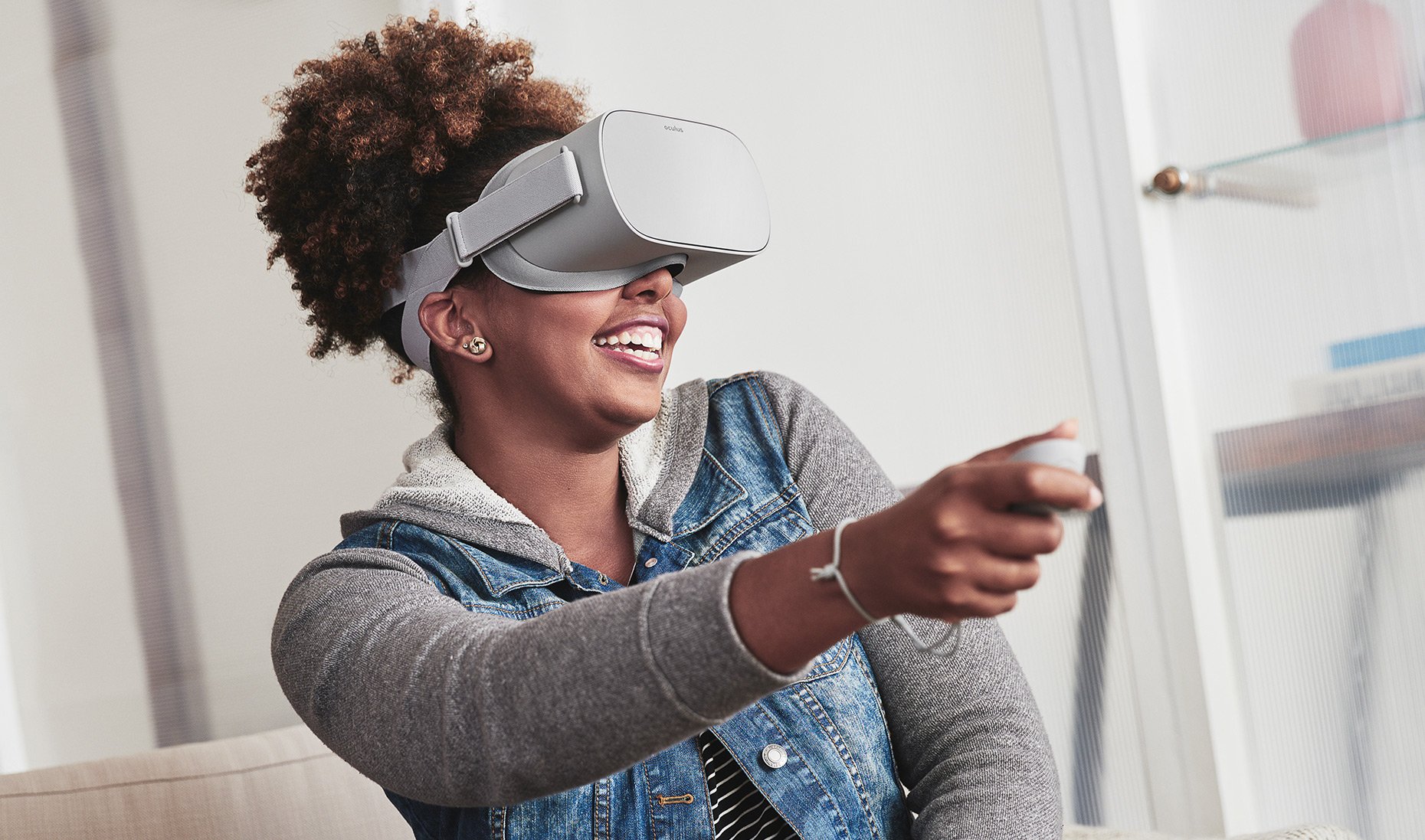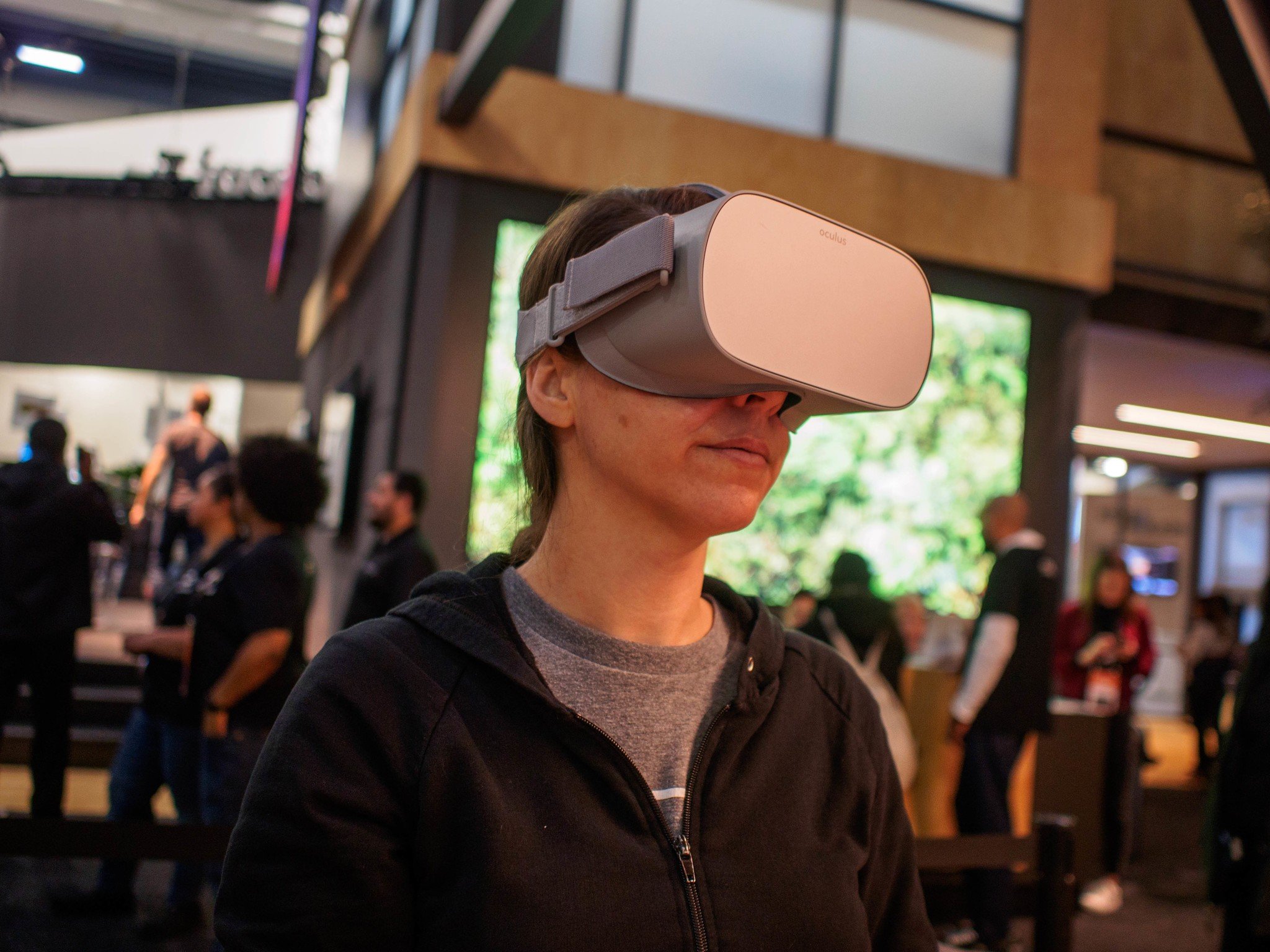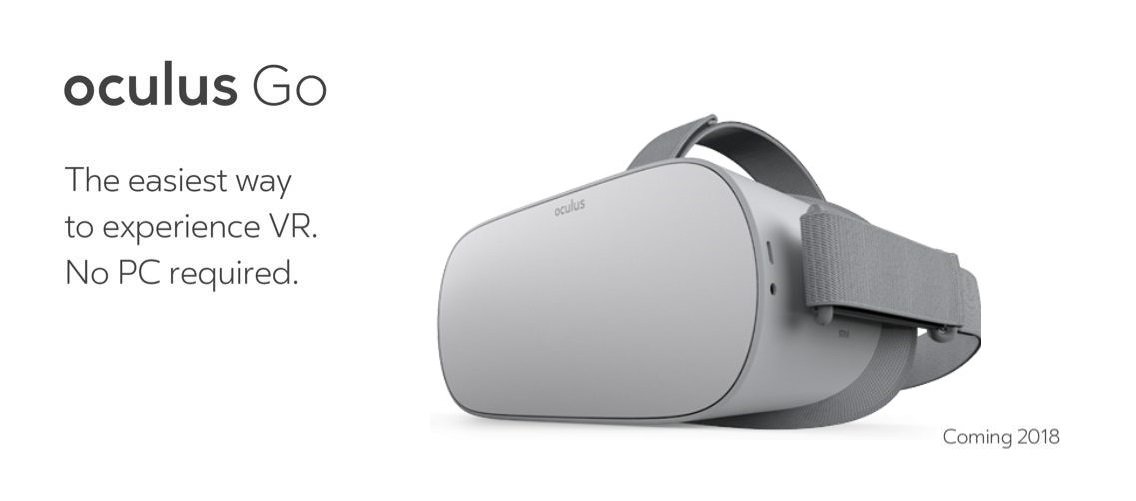We now have a third headset on the way from Oculus.
At Oculus Connect 4, Mark Zuckerberg announced that Oculus is working a new headset that sits in a "sweet spot" somewhere between Gear VR and Rift.
Officially called Oculus Go, this headset requires no phone and no cables running to the PC. It will be able to play movies, run games, and help you meet up with friends in VR. We've got the details for you here!
March 21st Update: Oculus Go updates from GDC
Our very own Russell Holly is at GDC feeding us with information! Jason Rubin, the VP of Content with Oculus states that, even though desktops are a priority, standalone headsets are the future. Seems that Oculus is aiming to remain in the future with their marketing as well, hoping to attract consumers with big name games and apps and keep them there, allowing existing content to speak for itself.
Oculus even took the time to reiterate the specs listed below, saying that OGO will basically be a phone when it comes to hardware, albeit with less overheating and better battery life. Furthermore, instead of limiting the eye buffer to 1024x1024 like it did on the Gear VR, Oculus is using Fixed Foveated Rendering to make the display clearer. To them, this means it will be very difficult to see the burls in the display, something we're very excited to test out for ourselves.
The headset will also be capable of 72FPS, instead of the 60FPS ceiling on Gear VR. 72Hz means the display can be brighter and more vibrant. Lots of Gear VR apps can already handle this bump, but devs have to request it when porting to Go.
What is Oculus Go?
Oculus Go is the third headset from Oculus, and it's meant to sit between Gear VR and Oculus Rift. A cordless headset, you'll no longer have to strap in at your PC or have enough juice on your phone in order to play in VR.
It is built to be lightweight, has a new mesh foam interface, and it supposedly has the best visual clarity so far seen in VR, thanks to new lenses and a WQHD LCD fast-switch display with a higher fill-factor than OLED. We learned at CES 2018 that Oculus Go is going to be made by Xiaomi, and it will be run by a Snapdragon 821 processor making it more than capable of playing the awesome games that are going to be available.
Oculus says this headset lives somewhere in between the Gear VR and Oculus Rift, but it leans much closer to the Gear VR than you might expect. This is a standalone headset, meaning the computer is inside the headset with the display, but it's still an Android-powered headset. The good news is this means it will run many of the apps currently available for the Gear VR. That means the headset will not let you walk around and do much. Functionally, this will be very similar to the Gear VR.
Read more: Lenovo Mirage vs Oculus Go
Whats the difference between Oculus Go and Gear VR?
To begin with, Oculus Go is a stand-alone headset. This means no need to be wired into your computer like Oculus Rift, or the need for a top of the line phone like with Gear VR. It's a middle of the road option that is priced affordably in an effort to draw in new users to help Oculus reach their goal of one billion VR users.
Instead of including headphones with the headset, a spatial audio experience is built right into the headset. That is spatial speakers that are built on the rails of the headset to let you hear what's going on clearly without headphones. Of course, if you'd rather go with classic headphones, you can plug a set of your own into a 3.5mm jack. Oculus Go will have a controller similar to that of Gear VR, meaning devs can create apps that work on both platforms.
Indeed, a lot of the Gear VR's best apps will be available for the Oculus Go from day one. The controller employs three degrees of freedom (DoF), which is the same as the Gear VR controller. It's interesting to note that the Go headset will also use three DoF. To put that into perspective, the Oculus Rift uses six DoF.
Oculus Go will also have access to its own catalog of games and apps to dive into on launch day. While ports of Gear VR games are sure to show up, you'll be getting access to new content with Oculus Go. From the photos we've seen of Oculus Go, there is also a fairly pared down look compared to Gear VR. No touchpad on the side of the headset, and only two buttons on the top; volume controls, and a power button.
Games and Experiences
Since we have been notified that Gear VR apps and games will be compatible with Oculus Go we know we'll have plenty to keep us occupied. Some of the titles in games you'll be able to play are:
- Where's Om Nom?
- Bait!
- Cloudlands VR Minigolf
- Lands End
- Ocean Rift
- Smash Hit
- Rush
- VR Sports Challenge
- Dragon Front
- Sing Space
- Dead and Buried
- Anshar Wars 2
- Ultrawings
- Rangi
- Catan
- Anshar Online
- Piece By Piece: Assembling They Suspect Nothing
And as for Experiences you'll have:
When is it launching?
The official website for Oculus Go still has the announced release date to be sometime in early 2018. If you want to keep notified keep checking in or sign up for their e-mailed newsletter by following the link below.
Redditer LifeWithAdd has found an image released by Oculus where it simply says "2018" instead of "early 2018". Yet, as the website still shows "Early", we'll be expecting the headset before June 2018!
Get notified about the launch date at Oculus
How much will it cost?
While we don't have an exact launch date yet, we do know how much Oculus Go is going to cost. You'll be able to pick up this standalone headset for a tidy sum of $199. Considering Gear VR alone costs $129.99 and requires a top of the line smartphone, this is pretty exciting news!
Are you excited?
For now, we don't have a ton of information about everything that Oculus Go will be able to offer, but that should be changing soon. However, the details we do have are definitely worth getting excited about, especially since this is a stand-alone headset, with an affordable price tag. Are you excited about Oculus Go, or are you sticking with another Oculus headset? Let us know about it in the comments below!
Updated March 2018: We've updated this post with all of the information given to us from GDC!
from Android Central - Android Forums, News, Reviews, Help and Android Wallpapers https://ift.tt/2CSrDTO
via IFTTT







No comments:
Post a Comment